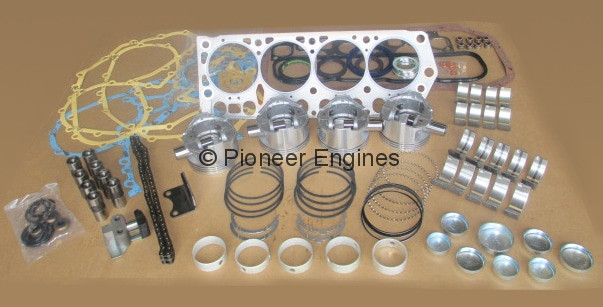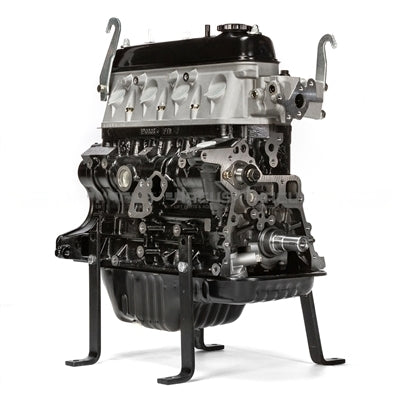Why the 4Y Engine Is a Top Choice for Reliable and Long-Lasting Performance
Why the 4Y Engine Is a Top Choice for Reliable and Long-Lasting Performance
Blog Article
The Ultimate Overview to the Engine: Key Insights for Every Vehicle Enthusiast
Understanding the engine is basic for any type of auto enthusiast, as it works as the heart of the vehicle and dictates its performance. This overview offers a thorough exam of engine composition, types, and the mechanics behind their procedure, consisting of the cutting-edge innovations that are reshaping the vehicle landscape. It emphasizes the important nature of maintenance methods that can considerably influence an engine's life expectancy. However, the intricacies of engine characteristics and the most recent advancements in modern technology existing questions that merit more expedition. What might these insights reveal regarding the future of vehicle engineering?
Composition of an Engine
Recognizing the composition of an engine is vital for any type of cars and truck fanatic seeking to delve deeper right into vehicle technicians. An interior burning engine mostly contains several crucial components that operate in unison to transform gas right into power.
At the heart of this system exists the cyndrical tube block, which houses the cylinders where combustion occurs. Piston motion within these cylinders is promoted by the crankshaft, which equates linear activity into rotational power. Additionally, the camshaft plays an important duty in managing the opening and closing of the engine's shutoffs, guaranteeing correct air-fuel mixture intake and exhaust gas expulsion.
Other necessary components include the fuel system, which supplies the engine with the required fuel, and the ignition system, responsible for starting burning - 4y engine. The cooling and lubrication systems are likewise essential, maintaining optimal operating temperatures and lowering rubbing, specifically
Engine Kinds and Configurations
A diverse array of engine types and configurations exists, each offering unique advantages and drawbacks tailored to various driving demands and choices. The most usual engine types consist of inline, V, flat, and rotary configurations.
Inline engines, including cyndrical tubes prepared in a single line, are understood for their simplicity and effectiveness. They are usually discovered in small lorries, supplying an equilibrium of power and economic situation. V engines, identified by their 2 banks of cylinders arranged in a V form, supply greater efficiency and smoother operation, making them preferred in sports and deluxe autos.
Flat engines, or fighter engines, have flat opposed cyndrical tubes, which add to a lower center of gravity, enhancing vehicle security. These are generally seen in brand names like Subaru and Porsche.
Rotating engines, although much less usual, make use of a distinct layout with a triangular blades and deal high power-to-weight ratios. They master lightweight and portable applications, primarily seen in Mazda cars.
Each engine kind serves certain performance features, weight distributions, and fuel performances, guaranteeing that auto enthusiasts can select the best engine arrangement to match their driving design and lorry needs.

Just How Engines Function
Engines, no matter their kind or setup, operate on fundamental principles that control their performance and effectiveness. At their core, engines convert fuel into power through a series of controlled explosions or compressions. This procedure commonly entails 4 primary strokes: intake, power, exhaust, and compression.
Throughout the consumption stroke, the engine draws in go to website a mixture of air and gas. The compression stroke complies with, where the combination is compressed in the cyndrical tube, enhancing its temperature level and pressure. In the power stroke, a trigger stirs up the pressed combination (in gasoline engines) or the mixture sparks automatically (in diesel engines), causing a fast expansion of gases that presses the piston down. Lastly, the exhaust stroke eliminates the invested gases from the cyndrical tube.
The effectiveness of an engine is affected by various elements, consisting of the style of the combustion chamber, the kind of gas utilized, and the accuracy of the engine's components. Recognizing these essential principles is critical for car fanatics that look for to value the elaborate auto mechanics behind their lorries, as well as for those aiming to enhance performance via alterations and tuning.
Advancements in Engine Innovation
Over the last few years, advancements in engine technology have significantly transformed the vehicle landscape, enhancing both efficiency and ecological sustainability. Among one of the most notable technologies is the advancement of turbocharging and supercharging, which enables smaller engines to create higher power outcomes without compromising fuel effectiveness. This has brought about a surge in the popularity of downsized engines, giving manufacturers with the ability to fulfill rigorous discharges policies while keeping efficiency standards.
In addition, crossbreed and electric powertrains are improving the engine standard. Crossbreed systems integrate interior burning engines with electrical motors, maximizing fuel consumption and minimizing exhausts. Totally electrical cars (EVs) get rid of the burning engine completely, depending on advanced battery modern technology to supply instantaneous torque and excellent velocity.
Additionally, the assimilation of artificial knowledge and device knowing in engine administration systems allows for real-time optimization of efficiency criteria, boosting performance and responsiveness. Innovations such as variable shutoff timing and straight fuel shot additionally improve combustion processes, making best use of power outcome while decreasing waste.
As the vehicle market remains to evolve, these advancements in engine modern technology will play a vital function in forming the future of wheelchair, focusing on both performance and sustainability.
Upkeep Tips for Enthusiasts
Preserving an engine is as vital as the advancements that improve its performance. Routine maintenance not just lengthens the life of your engine yet additionally makes blog here certain ideal efficiency. Begin with regular oil modifications, following the supplier's suggestions for oil kind and change intervals. Clean oil lubricates engine elements effectively, preventing deterioration.
Replace and inspect air filters periodically to ensure appropriate air flow, which is critical for burning performance. A stopped up air filter can result in decreased efficiency and enhanced fuel intake. Likewise, keep an eye on the coolant levels to avoid getting too hot, and replace coolant according to the service timetable.

Conclusion
In verdict, a complete understanding of engine composition, types, and auto mechanics is essential for automobile lovers. Normal maintenance techniques, including oil changes and air filter checks, are critical for guaranteeing ideal engine capability and durability.

Engines, regardless of their type or configuration, run on essential concepts that regulate their performance and efficiency. In the power stroke, a stimulate fires up the pressed blend (in gas engines) or the mixture stirs up spontaneously (in diesel engines), resulting in a rapid growth of gases that pushes the piston down.In current years, improvements in engine modern technology have significantly changed the auto landscape, improving both additional hints performance and environmental sustainability.
Report this page